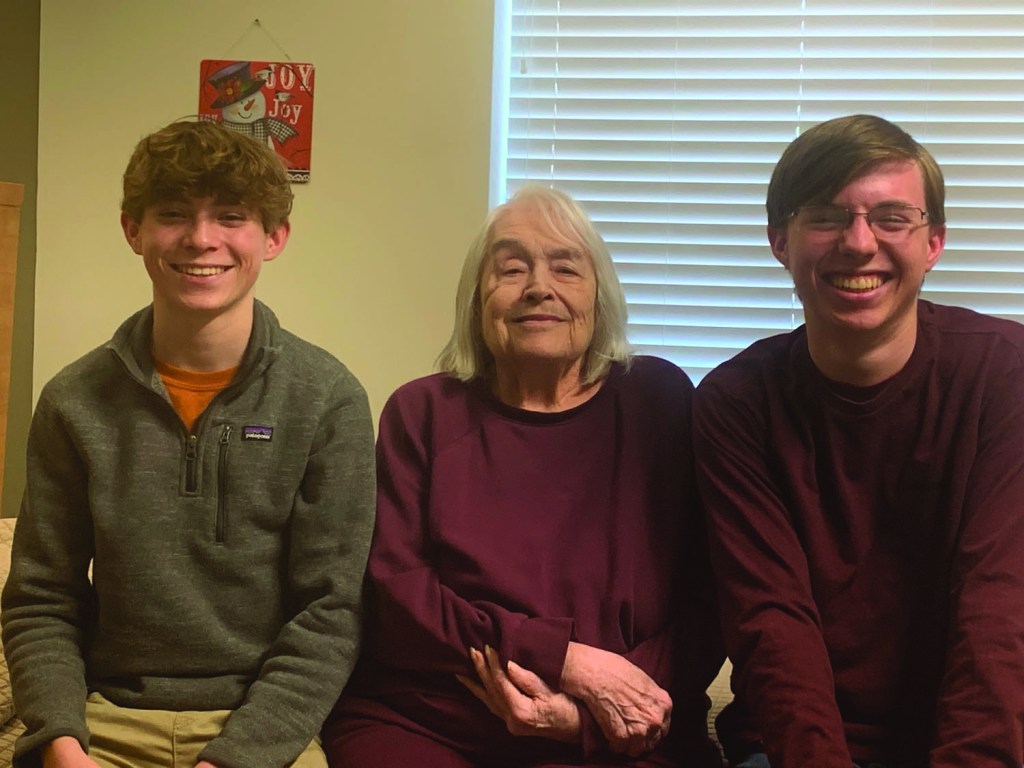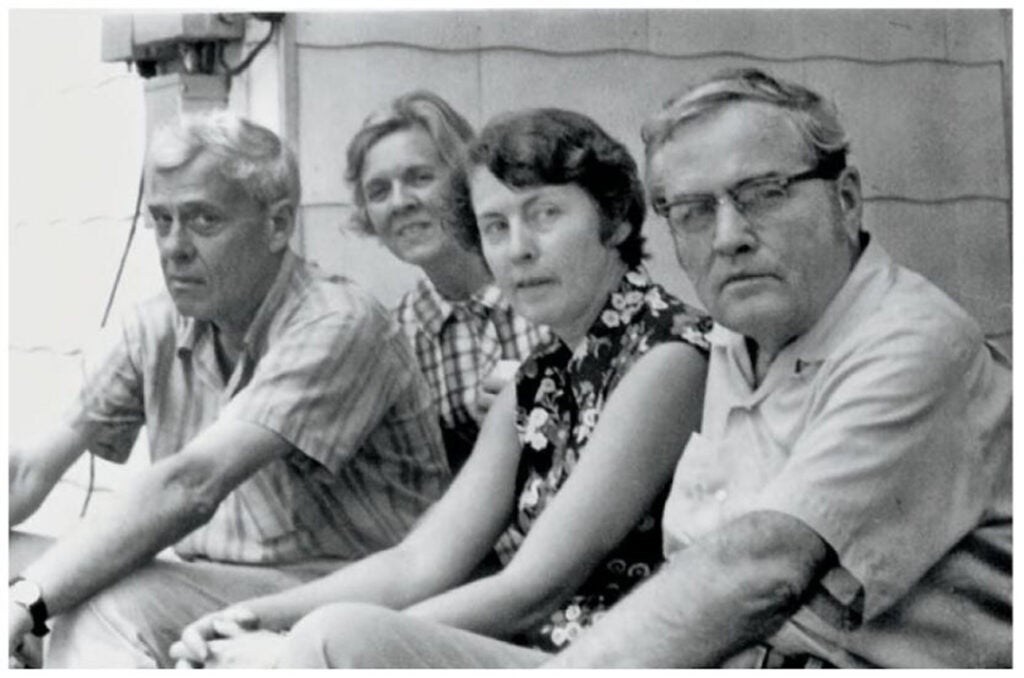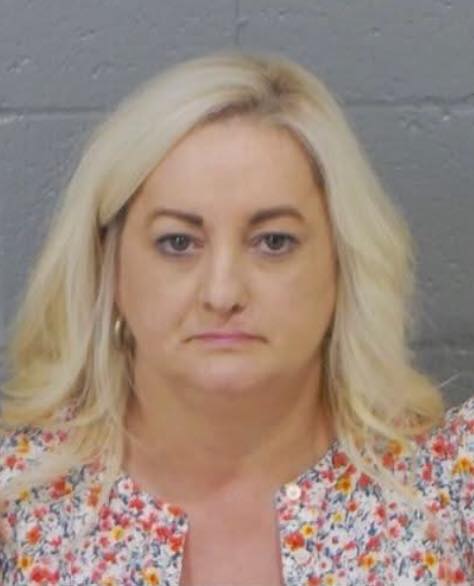Rediscovering the Writing Rosses
Published 2:01 pm Tuesday, July 16, 2024

- Heather Ross Miller, center, is shown with grandsons Finn Miller and Alexander Miller. (Contributed)
|
Getting your Trinity Audio player ready...
|
Twenty-five years ago, Jean Ross Justice mailed a parcel from Iowa City to the library in Albemarle. Justice wanted the Stanly County library to have a copy of “Late Leisure,” the fifth book of poems written by her older sister, Eleanor Ross Taylor. But from Justice’s cover letter, it appears that people back home in Stanly County were late learning about the literary accomplishments of the sisters from Norwood.
In part, the April 1999 letter says: “I was happy to read in SNAP that you recently acquired my brother James’s novel, “They Don’t Dance Much,” and was pleased to read about our family — a little disappointed, though, that Eleanor wasn’t mentioned, or, for that matter, that I wasn’t!”
In today’s Stanly News & Press article, the siblings are all “mentioned” along with niece Heather Ross Miller. But it’s just a skimming from the surface of five writerly lives who processed family stories and their own everyday existence with pen and paper or by tapping on a typewriter. An unabridged perspective on home life, hardship, happiness, faith, corruption, truth and beauty can be seen only with a deep dive into their writings.
In 2005, the Norwood Book Club presented a 20-book collection of the four Rosses’ published works to the town museum and library. Hometown heroes then, and now almost 20 years later, the Ross name is scarcely familiar except to longtime Stanly County residents over a certain age.
“We were not famous,” says Miller.
Maybe not, but Miller and her elders earned respect as poets and writers of fiction and non-fiction in wide-ranging literary circles spanning 80 years.
James, Fred, Eleanor and Jean, born between 1911 and 1924, and raised on a farm in the southern end of the county, drew from their experiences in the Depression era South — a time and place identifiable and powerfully present in their written words. Parents Fred Elbert Ross Sr. and Jennie Lilly Ross were not writers, yet their storytelling antics were rich gifts to their sons and daughters, and granddaughter Heather.
At 85, her memories of those tale-telling days shine clear and dear.
“I soaked in those stories like a sponge. They were funny, sometimes profound or enlightening. Even the gossip was funny, easy to turn into fiction,” Miller said.

The Writing Rosses — James, Eleanor, Jean and Fred — left much literature for the world to enjoy. (Contributed)
Jean Ross Justice (1924-2016)
When Jean Justice wrote to the Albemarle librarian, she’d been writing poems and short stories for more than 50 years since graduating from Woman’s College (now University of North Carolina at Greensboro).
Early compositions were published in magazines like “Esquire” and later in literary journals like “The Yale Review,” and John Grisham’s publication, “The Oxford American.” She’d already received the 1989 O. Henry Award for her short story, “The Sky Fading upward to Yellow,” which was selected from thousands.
While in graduate school at UNC-Chapel Hill, Jean met Donald Justice, a poet and professor from Miami. They married in 1947 and moved where Justice’s teaching assignments took them. His poetry garnered a Pulitzer Prize in 1980, and in the 1990s the couple returned to Iowa City where Donald had taught at the University of Iowa. He died in 2004, but Jean remained there among friends.
In 2008 she published her first book, “The End of a Good Party and other Stories.” She was 84.
Jean’s second book, “Family Feeling,” came out in 2014, followed by the novella, “Till My Baby Comes Home,” with its familiar small-town North Carolina World War II setting. It was published in 2016, two months before her death. Jean was 91, a writer to the end.
The 2022 volume of “The Unsung Masters Series” titled “Jean Ross Justice: On the Life and Work of an American Master” recognizes a writer who may have been “vastly under-appreciated,” but whose body of work secures her place in “one of America’s most distinguished literary families.”
Eleanor Ross Taylor (1920-2011)
Eleanor graduated from Woman’s College ahead of Jean and accepted a fellowship for a creative writing graduate program at Vanderbilt University where she met Peter Taylor, a poet and novelist. They were married in 1943 and in 1946 Peter began his teaching career at Eleanor’s alma mater.
One of Peter’s friends, Randall Jarrell, a widely acclaimed poet-critic and fellow professor, encouraged Eleanor’s exceptional talent. Friends and family note that Eleanor and her poetry gained attention because of Peter’s sociability, but her poetry earned its own accolades, first in literary magazines like the “Paris Review,” then in her published collections. “Wilderness of Ladies,” was published in 1960 and five more books followed, along with major literary awards.
Meanwhile, Peter’s academic career culminated at the University of Virginia, and in 1986 he became the family’s second Pulitzer Prize winner with his novel, “A Summons to Memphis.” While the writing couple spent several summers in Norwood, they retired in Virginia where Eleanor continued writing and publishing after Peter’s death in 1994. Their daughter, Katie, died of cancer in 2001.
Eleanor’s last book, published in 2009, led to the capstone $100,000 Ruth Lilly Poetry Prize — given to “a living U.S. poet whose lifetime accomplishments warrant extraordinary recognition.” A prize befitting the poet’s 90th birthday.
The Taylors’ son Ross, also a poet, in an online eulogy shortly after his mother’s death in 2011, described Eleanor’s conventional, domestic life and how her poetry spoke truth. In his words, “As a mother, she was lovably predictable. As writer, all bets were off.”
James Leland Ross (1911-1990)
James, oldest of the siblings, and still in his 20s, didn’t set out to write a book. He played college and semi-professional baseball, worked odd jobs and was writing and submitting short stories to magazines, though without success.
His first break came after a novelist friend suggested a book might give him name recognition. The struggling writer took a day job with the Greensboro IRS office and gave concerted effort to telling a story showing life the way it was. In 1939, he mailed the first 100 pages of his proposed novel to the Houghton Mifflin Company. They gave him a $250 vote of confidence to finish the job.
That 1940 debut novel, “They Don’t Dance Much,” received high praise from other successful crime novelists, and a congratulatory note from Earnest Hemingway, yet the “country noir” story didn’t sell much. James was the first Ross family member to publish a book and looked forward to the satisfaction of publishing another. Then World War II and a call up by the U.S. Army slowed the process.
Back in Greensboro after the war, James discovered his foray into novel writing did lead to publication of his short stories in magazines such as Sewanee Review and Colliers.
Then by 1955 he was working at the Greensboro Daily News (now the News and Record), where he earned awards for his reporting and editorial commentary and where he met his wife, Marnie Polk, also a writer and UNCG graduate like his sisters.
A year before his 1976 retirement, his book was reissued by Southern Illinois University Press in the “Lost American Fiction” series.
An introduction by Daniel Woodrell to a more recent edition said, “‘They Don’t Dance Much’ coulda, woulda, shoulda, baby, but for some reason didn’t, a fate that is eerily in keeping with the ethos of the book.”
James died in 1990 after years of poor health, exacerbated perhaps, said Mrs. Ross, by the rejections of his second book, “In the Red.”
Regardless, according to Bill Morris, a former Greensboro journalist, knowing that James Ross “came out of the red-clay gulches of rural North Carolina during the Depression,” taught him that “a writer can come out of absolutely anywhere at any time…It was the sort of encouragement and inspiration only the luckiest aspiring writers get. Coming from Jim Ross, it meant the world.”
Fred Elbert Ross Jr. (1913-1993)
Of the four writing Rosses, Fred is the only one who settled in Stanly County after college. He married Geneva Smith from Norwood’s Cedar Grove community in 1936 and even played baseball for Alcoa while he worked in the payroll department. The couple made their home in Badin. Their only child Heather was born in 1939.
Fred was the first editor of the Badin Carolinian.
His personal publishing journey began with a suggestion from his sister Eleanor that he try short stories. In a 1951 interview, he told how rejections spurred him to keep at it until success came in 1947 with the publication of “The Unbowed Head,” a story about cockfighting.
A suggestion that he turn that short story into a novel led to a four-week writing marathon to meet a contest deadline. He submitted five chapters to a Houghton Mifflin editor and won a rare literary prize of a $2,400 fellowship to finish writing the book titled “Jackson Mahaffey,” published in 1951.
One book reviewer introduced Mahaffey as “a Carolina boy who made good and fought, traded and drank his way into the staid walls of the legislature.” In a newspaper interview at the time, Fred said, “If this book sells, I might take Jackson through a term at Raleigh and introduce his children. I’ve grown fond of Jackson and would hate to part with him completely.”
After leaving Alcoa, Fred continued writing as an editor with newspapers in Mt. Holly, Lillington and Jonesville, until he retired from the Yadkin Enterprise in 1976. He and Geneva returned to the Ross family homeplace on Cottonville Road. He sold freelance articles and photographs to some large North Carolina daily newspapers and produced a folksy “Flotsam and Jetsam” column for the Norwood News.
Ross dedicated “Jackson Mahaffey” to Geneva and Heather and planned to honor his sister Eleanor with the sequel. But “Jackson” has yet to reappear, and Fred Ross died in 1993. Neither of the brothers lived to see their sisters’ book publishing successes, but Fred’s daughter has added another branch to the writers’ family tree.
Heather Ross Miller (1939 – )
Heather was already putting words on paper when her father’s first novel was published. By the age of 25 she had published her first novel, “The Edge of the Woods,” which led the way for more than a dozen books of poetry and short stories, many of which were set in her hometown.
In a recent interview, Miller said, “When I was a child in Badin, we lived in dormitory-like apartments where walls were thin like cardboard. You could hear everything.” And, of course, an only child who spends time with adults doesn’t miss much of the goings on.
“There was so much drama and energy in family relationships. I always wanted to tell the stories…the things they said and didn’t say,” said Miller.
“I heard stories from my aunts about professors and college life. It seemed like an extension of the family,” added Miller. “It seemed natural to go to WC (Woman’s College).”
Miller earned two degrees in the 1960s during Randall Jarrell’s tenure.
“I learned from Jarrell about teaching and tried to give to my students what he gave to me,” said Miller, who went on to teach at the college level. “He respected us and our writing, even if he didn’t like it.”
Heather Ross married Clyde Miller on Valentine’s Day, 1960 at Wesley Chapel near Pfeiffer College, Miller’s alma mater.
“There was snow on the ground,” recalls Heather, and her parents thought he was too old for her.
“My favorite place in Stanly County is still Morrow Mountain, where we met and first lived,” said Miller.
In December 1961, the Millers and their first child, Melissa, moved to a small pine-paneled cottage in the woods of what is now Singletary Lake State Park — a Bladen County wilderness of cola-colored water, white sand, Spanish moss and adventure, where their son Kirk was born and where the family spent 13 years.
Heather’s memoir, “Crusoe’s Island,” published in 2000, tells that story. Kirk Miller considers it his favorite of his mother’s writing and still envisions her at her desk, typing on her Royal typewriter.
But he says, “I always think of her first as a mother—we could interrupt her anytime.”
Like her aunts, Miller wrote in between her domestic duties. She also taught English and creative writing at junior colleges, at Pfeiffer College (now Pfeiffer University) and the University of Arkansas.
In 1984 Clyde retired from his park ranger career to a home on Elm Street in Badin. Then the cancer diagnosis came in 1990.
While he was dying, Heather wrote of their years at Singletary and Clyde edited her “mis-rememberings.” It was their gift to each other.
After her husband’s death in 1991, Heather taught at Virginia’s Washington and Lee University for several years before returning home to Stanly County.
“I loved everywhere I taught, but especially Pfeiffer…the family connections and friends,” said Miller.
Professional fellowships and awards such as the North Carolina Award in Literature received from Gov. Jim Hunt in 1983, the Sir Walter Raleigh Prize for Fiction and the Distinguished Alumni Award from her alma mater in 1976, leave no question of Miller’s place in the Writing Ross family.





